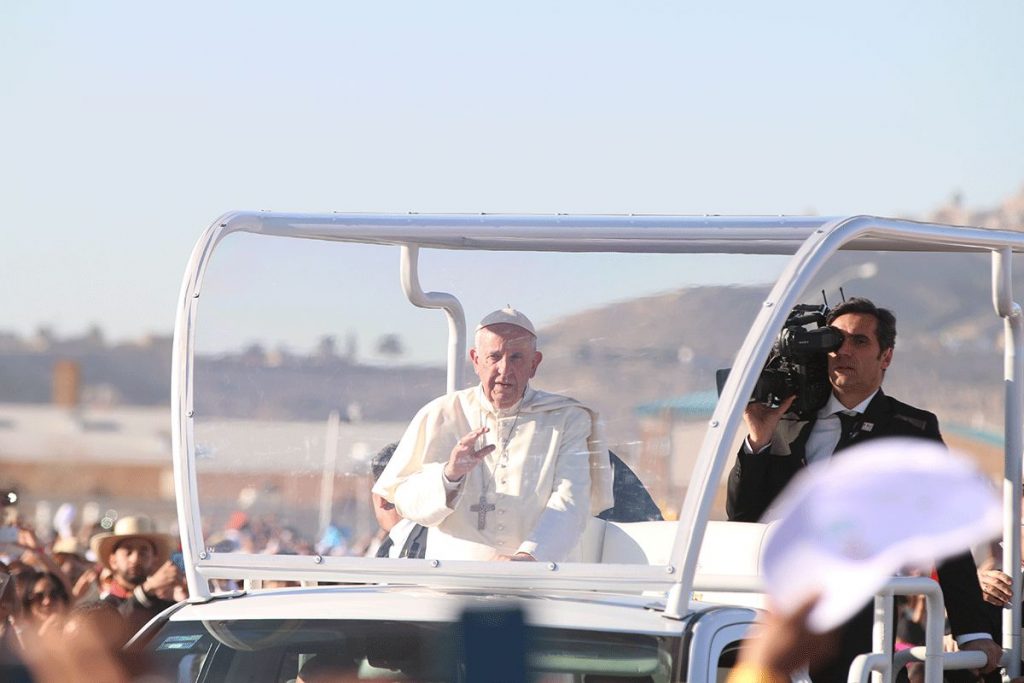Last week, I had the privilege to cross over the border into Mexico and concelebrate Mass with our Holy Father Pope Francis in Ciudad Juárez.
This Mass was a tremendous, joyful celebration of life and hope. It was one of those moments when you can really see that the Church is a beautiful family. So many thousands of people — priests and religious and so many children and families — traveling from all over Mexico to pray with our Holy Father.
It was clearly an emotional week for the pope, trying to bring a word of hope and mercy to some of the poorest and most oppressed people in this hemisphere. He seemed deeply moved by the human tragedy of millions of people suffering from the corruption of leaders, criminal gangs, human trafficking, violence, and poverty and , economic injustice.
And the plight of immigrants and refugees in Mexico and the U.S. was a constant theme throughout the pope’s week-long pilgrimage. The Mass in Juárez dramatized the ongoing challenges that we face along our shared border with Mexico.
It is sad that immigration has become such a divisive issue between our two countries and also in our domestic politics here in the United States. It is especially sad to see divisions among U.S. Catholics, since the vast majority of us are sons and daughters of immigrants.
For the pope, and for all of us who are pastors in the Church, immigration is not a political or economic issue. Immigration is about people — and more and more it’s about children and families.
It is the duty of a sovereign nation to have secure borders. No one disputes that. But the further challenge we face in the U.S. is how to respond to the 11 million people who are living within our borders without documents.
Right now, they seem to be human pawns in the make up of what looks like a permanent “underclass.” Most of them have been here for a long time and they are working hard, contributing to our society and our economy, but they have no rights and they live in constant fear of being arrested and deported.
As Christians, we need to help these people somehow — no matter where they come from, no matter how they got here. They are mothers, fathers, children, grandparents. They are all our brothers and sisters.
During the Mass in Juárez, I was praying for the whole family of God here in Los Angeles, and especially our brothers and sisters who are caught up in our broken immigration system.
And during this celebration, I felt the powerful presence of God’s love for us. It was a feeling that was real and true — that God does not leave us, he never leaves us alone. He is our hope — always close to us in his tender care, in his mercy; and he is especially near to those who are poor and those who are oppressed and suffering.
This has always been the Church’s experience in the Americas — ever since the Blessed Virgin of Guadalupe first visited our peoples so long ago. Our Blessed Mother came as the mother of mercy and she gave us the gift of faith, the gift of Jesus. The gift of knowing God’s closeness, his desire to share in our humanity.
The pope said the visit of Our Lady of Guadalupe was the beginning of a new civilization in the lands of the Americas — a new Christian civilization born from the encounter of the Spanish and indigenous cultures.
And as he spoke to the sufferings of the people in the Americas, Pope Francis called them — and all of us — to use our gifts to continue the mission of Our Lady of Guadalupe.
The Virgin gave St. Juan Diego the mission of building a “shrine of God.” That’s our mission too. And it is a continental mission. We are called to make our country and all of the countries of the Americas a “shrine of God.”
We build this “shrine” through our works of mercy and our acts of love. We build this shrine by walking with our brothers and sisters, bringing the light of God’s love to shine in our homes and neighborhoods, our parishes and schools — in every area of our society and culture.
So in this Lenten season, let’s think more about how we can go out to the lonely and the wounded, the hungry and the homeless. Let’s reach out to those who are forgotten and despised in our society — the prisoner and the refugee and the immigrant.
I hope to see all of you at the Religious Education Congress this weekend. Let’s keep praying for each other and let’s pray:
May our Mother, the Virgin of Guadalupe, open our hearts to the love of God and help us to love as Jesus loves and show mercy to others as he shows mercy to us.
You can follow Archbishop Gomez daily via Facebook, Twitter and Instagram.

